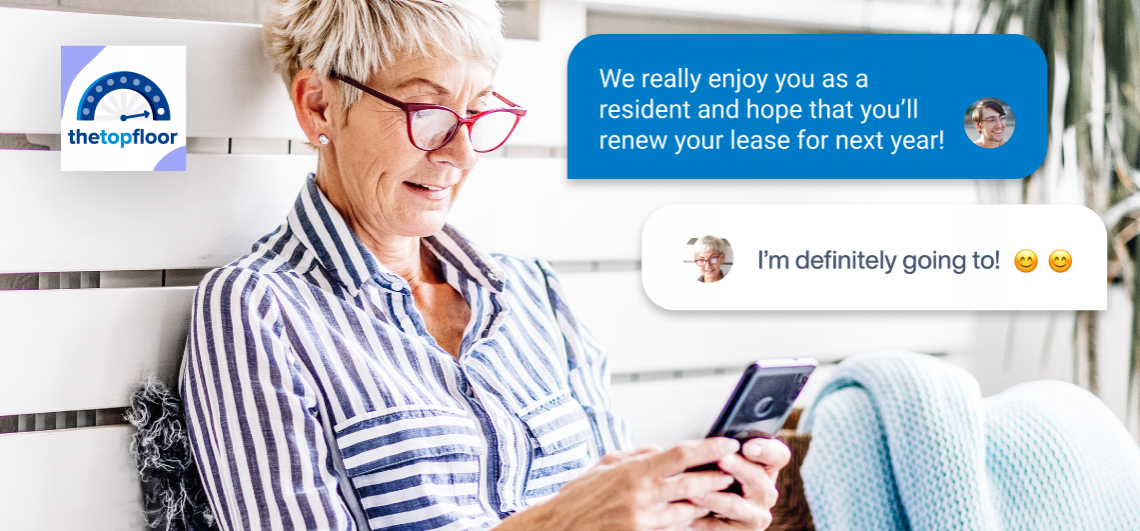Published on February 11th, 2021
By Brittany Benz, Megan Eales Monroe
When you’re in real estate management, customer service is the job. So much of your success hinges on whether or not your customers have positive interactions with your team. But meeting renters’ and homeowners’ expectations can be challenging.
This episode of The Top Floor is all about exceeding your customers’ expectations. With the knowledge of our experts, we want to help our audience understand:
- How digital experiences impact your leasing success
- How property managers and community association managers can assess customer satisfaction
- Recent shifts that have occurred in customer expectations
- Why effective communication is central to customer satisfaction
Listen now:
Episode Transcript:
You’re listening to The Top Floor, a podcast featuring critical conversations around property management, community associations, and real estate investing. I’m your host, Sean Forster, the industry trend researcher at AppFolio. Every other week, The Top Floor we discuss change, innovation, and opportunities for the future. With help from thought leaders and change-makers, we’ll give you inside-access to our world at the height of industry disruption. Here’s Megan Eales Monroe.
Megan: Alright, so we’re going to kick off this episode with a bit of an exercise. Think back to your first home or apartment of your very own. There are thousands of little details that make up these memories, but the one we’re most curious about today is the service you received from your property manager.
Everyone has a property management story, because – let’s face it – no matter what kind of community you live in, management has a huge influence over your experience.
Jackie: The first time I lived in the apartments was when I first started in this business. I happened to be there and got hired because I was laying at the pool one day, minding my own business and she needed somebody to come in to work.
Megan: Jackie Ramstedt, a friend of AppFolio and a consultant with 30-years experience in the apartment industry, shares the story of how she got into property management.
Jackie: I thought, “Oh, well, you just don’t need to have any background at all to be in this business.” And once I got into the business, I saw that disconnect between really wanting to help people because I thought that’s what it was – is that our job was to help people.
Jackie: And over the years now that I’m in the business and I’m helping other people on that, I always remember this, that the manager is the one that is going to set the tone for how … we treat people with dignity and respect. And …
Jackie: We’ve got to remind ourselves that we truly are the front line for everything.
Megan: Today on The Top Floor, we’re taking a look at renters and homeowners. When they’re interacting with property or community association managers, how important is the customer service they receive? What kinds of on-demand, modern experiences do they want? And finally, how has the pandemic changed their expectations of service providers?
But before we dive in, we need a bit of context. Not that long ago, we at AppFolio hosted a webinar to share some recent findings about renter’s preferences, especially when it comes to the leasing experience. We’ll add a link to that in our show notes. Guiding that discussion was AppFolio’s Stacy Holden, a frequent speaker with us here on The Top Floor. Here’s a bit from Stacy’s presentation.
Stacy: A lot of things have changed not only in our world, but in our industry, especially around the leasing experience. So today I would like to talk about what we have learned about the changes in the needs and expectations when it comes to finding a place to live. What are some of the best practices you and your team can take advantage of to adapt to those changes? And finally, what AppFolio has done to adapt to the changes within the virtual leasing experience.
Stacy: AppFolio conducted a survey with people living in professionally managed departments. One of the questions we asked was what are the reasons that you’re looking to move. The top answers validated what others are seeing from moving to less populated areas, and now having the flexibility to move, to a change of scenery because of the way their working has changed. So we know that people are moving and the reasons have changed, which means the way they’re looking for places to move to is changing, too. Meeting your future residents where they are today is going to be key to your leasing success.
Stacy: So when it comes to the overall virtual leasing experience, how is the industry doing? Well, we could use some improvement. According to our recent survey, only 47% said that the application process they experienced was easy. So, that means a little more than half were not so happy. So we dug a little deeper and asked what did residents want to see executed online in a contactless way? The top three were applying for the rental, signing or renewing the lease, and viewing the details of the unit. So what does this all mean for property managers?
Stacy: Well, here’s the good news. The demand of people moving is definitely there and yours for the capture. And there is an opportunity to get that interest and hold onto it through technology. In order to be competitive, you need to definitely meet those prospects today, where they’re at, when they’re ready to ask questions, and have those answers available, preferably virtually. You’ll want to give them the flexibility on how to look at your properties, whether that’s online or in person. And give them the service that will set yourself apart by enabling a complete virtual leasing experience.
Stacy: Make it easy and fast for them to get the information they need when they need it.
Stacy: In addition, artificial intelligence can adapt in times of distress, no matter what’s going on in the world. AI tools like this provide an immense amount of stability and continue to give customers an excellent experience. And remember tools like this capture every conversation and learn by then improving your customer experience day in, day out.
Megan: When it comes to attracting and retaining residents for your rental properties, it’s clear that experience matters. And that experience starts all the way at the beginning of their journey, during the leasing process. The leasing experience that you provide is a great window into the overall experience that they can expect when renting from your company – but it doesn’t stop there.
Once that new resident moves in, it’s time to wow them with excellent service. Not just to encourage lease renewals — but also because resident testimonials and reviews are key to establishing your company’s online reputation.
Jackie: I mean, it’s just like a restaurant. You’re going to go look up reviews and things like that. I mean, you don’t want to eat there if everybody says, food’s terrible. It’s the same thing with this.
Megan: So how do you know whether your service is measuring up?
We asked Jackie to name the top three things she’d look into first when working with a property management company to learn more about whether or not they are providing great service. Here’s what she said:
Jackie: Number one, it would be their collections. So either if happy residents generally pay their rent on time. So they’ve got a big delinquency amount. That’s number one. Number two, I want to see the trending on their occupancy and the renewals and to see how much we’re doing, where we’re trending on that. And number three, and probably most importantly, I would ask them, what kind of company are you partnering with? Even if it’s you’re doing it yourself, what is your return from customer service questionnaires or surveys? What are you doing with that information? I mean, you’re going to have people who love you just because they love you. And it doesn’t matter what you do, but I want to hear from the people you don’t hear from. That’s the surveys that, if well, we never hear but about 10%, well then there’s 90% of your property that has an opinion that we need to tap into and find out.
Jackie: I think we’ve got to survey what I call moments of truth in a resident’s tenure, when they first move in after the first thirty, sixty days, once things are kind of working around and then we need to find out things specifically, like after service requests, did we do well? Is there anything else you need? And it’s not to call and bug them all the time, but you have to have kind of a contact and at least a link that people can go on and send you directly as the manager, or if it’s a regional and you want to do that to let them know, “Look, I need to know how are things going in your apartment?” No news is not necessarily good news. No news means that nobody feels like, “Why should I tell them they’re not going to do it anyway.” That’s a horrible way of looking at things.
Megan: Frequent check-ins and surveys are a great way to get a pulse on how well your staff is meeting renters’ needs. Frequent and helpful communication, tailored to the needs of your portfolio, is also part of the job:
Jackie: You’ve got to devise a plan of customer retention and resident retention around the portfolio you have. You have to know who your residents are. You have to understand what they prefer and how they want to be contacted.
Megan: But ultimately, though your job is to respond to their needs, to really excel, you’ll need to think ahead – how can you better anticipate and get ahead of those needs? One of the best ways to do this is to provide on-demand, digital tools so they can get service when and where they need it.
To find out more about how and why these on-demand tools make such a difference for your ability to provide top-notch service, we reached out to a few more experts who actually work on researching the needs of the market, and building those very tools, particularly for community associations.
Up to this point, we’ve really focused on the expectations of renters — but many of these takeaways are equally relevant when it comes to working with homeowners residing in professionally managed Community Associations.
Whether or not your management portfolio includes these types of communities, such as Homeowners’ or Condo Associations, the insights you’re about to hear from our next guests are just as relevant.
Beth: Sure. I’ll go first. So I’m Beth Gilbert, I’m the senior director of our community association market at AppFolio.
Joe: And I’m Joe Joe Saldaña, I’m a senior product manager who joined the AppFolio team back in 2016.
Joe: I think it’s helpful to start with the landscape just in general, thinking about the reality that we live in today … And so you think about all of the tools that you use in your daily life, thinking about things like Airbnb or Netflix, Amazon, Uber, all of those experiences are really shaping our expectations in terms of how we interact with technology and just our daily life – and really, conveniences at the center of all of these experiences. And so thinking about our customers through that lens, they’re not just competing the services in their same market in community association management, they’re actually competing with these other brand experiences. And so I think the expectations, because they’re exposed to these various services are shaping their interactions with their community.
Joe: They want things to be on demand, at the touch of a button without having to get on the phone and talk to folks. So I think that in itself is really helping to change expectations.
Beth: So the big crux of all of this is that you have to stay in tune with what’s going on, not only in the world, but also as Joe mentioned, as the home ownership portfolio and profile changes, what does that bring? And you have to understand that the instantaneous gratification people get from consumer apps is definitely going to impact what the expectations are, the kind of service they want to have and the experience they want from their day-to-day living. And that’s ultimately from a home ownership these are investments, or this is where they’re spending their daily lives and how that experience is and what you offer them as part of that living experience, it’s going to change as the times change.
Joe: So it certainly depends on the types of communities, but I think for the most part, homeowners really aren’t spending a lot of time thinking about how they’re feeling about their management company. Unless it actually directly affects them or there’s a purpose for them to engage, they need something done, they need to report something, they need to get some sort of information. And I think because of this, it’s really important that the management company especially is really being proactive about what they’re contributing in this working relationship, what they’re offering in terms of the partnerships.
Megan: Let’s pause here. Central to so many customers’ relationships with their service providers – property managers or community association managers – is both proactive communication and quick response time, whether they need information or something repaired. And here, Beth explains why providing this will set your company apart:
Beth: And I think right now, especially the communication, access to information, just being out in front of what’s going on in the world and then that community is just going to go so far ahead. And just be something that someone’s going to keep top of mind when they’re thinking about, “Oh yeah. What is that company doing for me?” Oh, I know I get my emails and I know I get my newsletter. It’s going to tie the things that actually bring value to them, as opposed to just checking the box. So that’s where it really can be a standout situation between a great management company and someone that’s just doing what’s on their list of responsibilities.
Beth: In many communities, it’s not uncommon to post things on doors like messages and announcements are posted on the gate to get into the community or you’re relying solely on mail. I mean, now it’s all about the instant communication and getting ahead of things, email and text messaging and just using technology more. And that was a big focus for us in 2020, was making sure we have the tools that … our customers needed to effectively communicate and proactively communicate with their communities. That’s whether it be a full blast out from an email perspective or text perspective, as simple as that may sound, that’s not available in all softwares, and you just need to have those tools available to you to get in front of the community members as quickly as possible.
Beth: And so many of our customers I can speak to that specifically leverage all of those capabilities that we offer in the product to make sure that their homeowners had the information they need, they were aware of the changes that were going on within the community, what needed to be closed, what didn’t, and that’s just continued for us. They won’t go back now. They are always going to communicate that way, which is great because it’s technology is such an easier way who wants to walk around door-to-door to post something on a door. I don’t think anyone wants that anymore.
Beth: And that’s really what these management companies they need to do. They need to stay in tune with their customer who was really the board’s hiring them. It’s like the homeowners are volunteering to be these board members. They’re the one that’s hiring the management company. So if you’re not in tune with what they need and working with them in that partner mindset, in that partner mindset … you’re not going to succeed long-term, because there’s going to be another opportunity potentially for another company that’s going to come in and be able to offer better service, or you fail at how you’re working with your homeowners and then there’s complaints, and then you’re not going to have that association anymore.
Jackie: They want a voice …
Megan: Here’s Jackie again, echoing this point from the renter’s perspective.
Jackie: They want to be heard. They don’t want you to dictate to them. And … They have an expectation level of speed and having a voice and to live up to the hype that your advertisement said, “Oh, this is the greatest place in the whole world. And we get to your service request some time and we don’t have any complaints from our residents.” And they move in and you blow them off on the service request. And people’s homes are what I call the core part of living. You have to be happy at your home.
Megan: We can’t emphasize enough what Jackie just said – people’s homes are incredibly important to them, perhaps now more than ever. Joe shed a little light on how this looks for homeowners in associations:
Joe Saldana: Another example, a lot of people in the midst of this pandemic are staying home and being safe. And what that means is that they’re focusing in on their dwelling they’re making those home improvements because that’s the only place that they can be and enjoy right now. So one of the focuses in 2020 was definitely on those architectural review process and making sure that that was a streamlined online experience that was suited for getting things done quickly. And so we introduced the concept of the ability to set the stage with custom instructions to let them know what the process might look throughout the approval. And then we also enabled in-app communication so that they could have centralized communication about all of the nuances of the projects.
Megan: Clearly, your residents’ satisfaction hangs in the balance when they reach out to management with requests like these ones — so how can you make sure your team is always on top of it? Providing great customer service is only possible when your team has the time to fully devote their attention to the task at hand, and here’s where automation comes in.
Beth: I think you can easily get set in ways where you are accepting of all the manual processes that you’ve been doing for years upon years. We’ve talked to customers where it’s so easy to go, “Oh no, that doesn’t take much time. Is that the right way? Could it be better?” “Oh, I don’t know. I don’t think it can be better.” It definitely can be better. So there’s so much that technology can do to automate the tasks that are typically done in a very manual way and what that will do is open up opportunity to do what we talked about that exceeding the service level, because now you’re not dealing with all the minutia of things that easily can be handled by machine learning and AI, we have tools that out there today. And there’s other products in the market from a consumer standpoint that have that.
Joe: That’s so right. And I think another thing I think about when leveraging technology, it’s really about extending your level of customer service. So thinking about those moments when a homeowner is brainstorming at 10:00 PM just before she’s about to fall asleep about that new landscape that she wants to do in her front yard. Leveraging technology to be that service that’s available to the homeowner so that she doesn’t have to wait until the doors open the next day to get her job done. If she has questions, she can review documents online. She knows what the process is. She can submit that architectural review on her own time, on her own accord when it’s top of mind for her. So you’re not waiting for the management company, the management company is open doors 24 seven in that regard, which I think is a really powerful way to, as Beth said, exceed that customer service level, but really being available so that the person doesn’t have to talk to somebody or doesn’t have to wait, it’s on demand and it’s, self-service.
Joe: We’ve talked to homeowners who – their perception of their management company has been bad because they make them print things out and they don’t have a printer at home. So that’s like this added anxiety that they had. They actually really enjoyed the management company and thought they did a great job, but because they didn’t have those tools that provided them kind of the convenience that we talked about earlier, it degraded their relationships. So I think technology even does play a strong role in facilitating really healthy relationships because of that connection that you can establish virtually.
Joe: Because in each of those interactions where they’re saying, “Hey board president, how do I do this? Or how do I get approval for that?” They use those interactions to then redirect them to the portal and say, “Hey, you can find all of the association documents in your shared documents section.” Or “Hey, if you see that the hot tub isn’t working, you can submit a maintenance request whenever you want.” I don’t need to be that point of contact for you. So I think it’s also freed up just that customer service aspect from a board members perspective, because again, they can use technology as the extension of that customer service. So that they’re not having to spend time just after dinner, responding to somebody’s request. They can use that opportunity to leverage the portal as that resource for the community.
Joe: We have mobile applications for that top of mind concept … where a homeowner doesn’t have to dig through their email to figure out how they access their portal when it occupies that real estate right there on their phone. We’re leveraging AI as a differentiator in terms of our automated AP process to really streamline the operations to help our customers scale their business. Looking at all of those opportunities, where again, we provide those self service things online maintenance requests, online architectural requests, sharing documents, all of these components are aspects that increase that level of service.
Beth: I think it does come down and being creative and being how can we just embrace each other as a community? And help each other get through the last part of this. That might be the way of really elevating, is like let’s come together and figure out how we can get through this tail end, hopefully we are tail end together safely, so that way we can come out of this and just really embrace what we’ve been able to survive and get through together.
Beth: We have customers of ours who never expected to grow their portfolio of business during the pandemic. And they have had more growth in the history of their company because of the tools they had available to them and technology played a huge part in that. And so that’s just a perfect example of they were ready because they have the technology to do so.
Megan: Special thanks to Beth and Joe for helping us understand how technology can help you provide a better customer experience. Of course, one of the best things about technology is all the time it can save you — time that can be spent adding that personal touch that makes for memorable experiences.
Jackie: A surprise card every now and then, in the mail and … a handwritten note. Sometimes those kinds of what I call moments of truth, remind people that you really are in a people business.
Megan: A final thank you to Jackie, Beth and Joe for offering us an inside peek into meeting customers’ expectations. Well – that wraps up our first episode of The Top Floor in 2021. Let us know how you’re managing, and how you plan to exceed your customers’ expectations. Send us an email at podcasts@appfolio.com. Alright, Sean. Read us out.
Sean: Thanks for listening to The Top Floor. Join us here every other week for a new episode. For more information about today’s guests, visit us online at appfolio.com/blog. For more property management insights, follow AppFolio on LinkedIn, Twitter, and Facebook. Don’t forget to subscribe to The Top Floor on Spotify, Apple Podcasts, Stitcher, or wherever you listen. We’ll see you next time.













Comments by Brittany Benz